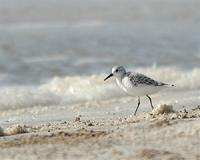 |
Washington (AFP) Aug 8, 2010 US officials on Sunday urged further study of the damage done to the environment by BP's broken well, and said clean-up efforts must continue despite claims that much of the oil had vanished from the Gulf of Mexico. "I think what we need to understand is there's a lot of oil that's been taken care of. There's a lot of oil that's still out there," said Coast Guard Admiral Thad Allen on CNN. "You need to keep a steady hand at the tiller here, keep this cleanup going," he said, describing it as a "catastrophe for the people of the Gulf" and calling for a close study of the damage done to the environment. "What was permanently done to the marshes and the beaches, what was permanently done to the juvenile fish and seafood stocks -- how does that relate to future losses? "We have to quantify that somehow. That takes a lot of study," Allen said. "And that's the process that we've been moving into now." The US government released a report last week describing how nearly three quarters of the oil that gushed into the Gulf from mid April to mid July had all but disappeared. That was followed by a letter released by the Food and Drug Administration on Friday that assured it was highly unlikely that the chemicals used to break up spilled crude into small particles would enter the food chain. However, top officials have also warned that the impact of the largest accidental oil spill in history is expected to be felt for decades to come. Asked about the apparent contradictions, Allen compared the process to how early estimates of the amount of oil being released by the damaged well -- ranging from one thousand to 65,000 barrels per day -- became more precise as time went on. "In the last few weeks, we have had better information and have been able to bring that down -- 53,000 barrels a day with a 10 percent error rate on either side." Now that the well is capped, "that then raises the question, what oil went where and what was done with it? "I don't think it's the end-all, be-all; I think it should evolve," he said of the National Oceanic and Atmospheric Administration (NOAA) report. "But it's more information than we had before." The report, released Wednesday, said three quarters of some 4.9 million barrels of crude disgorged into the Gulf of Mexico from BP's ruptured oil well has been neutralized by nature or human efforts. According to the report, only 26 percent of the oil remains close to its original form, floating on the ocean water or suspended under the surface. The other 74 percent has either evaporated or been burned, skimmed, recovered from the underwater wellhead or dispersed, the panel of government and independent scientists found. The Gulf of Mexico is known for its shrimp, crab, oysters, and dozens of species of fish. In the past, the fertile Mississippi Delta region provided for some 40 percent of US seafood production. Approximately one quarter of the Gulf is closed to fishing as a result of the BP spill. Amid concerns over the potential for toxins to enter the food supply after BP poured close to 1.8 million gallon of chemical dispersant into the Gulf to break up the crude slick, President Barack Obama's energy advisor said seafood testing in the Gulf would continue. "No one is saying don't worry. What we're saying is, right now the tests show nothing of concern," said Carol Browner, director of White House Office of Energy and Climate Change Policy on NBC's "Meet the Press." "We're going to continue to test. We're not going away. We're going to continue to work with the Gulf Coast communities, to make sure their economic losses are honored, to get the fisheries reopened when appropriate," she said. "You can't put this much oil out there and not be concerned." On Friday, the FDA said it had "determined that the chemical dispersant currently used to combat the Deepwater Horizon... have a low potential for bioconcentration in seafood species." "Although seafood is exposed to the dispersant, the inherent properties of the dispersants minimize the possibility of their being present in food," the agency said. BP said this week it has cemented closed the runaway well, which ruptured after an explosion on the Deepwater Horizon rig April 20 that killed 11 workers and unleashed the biggest maritime spill on record.
Share This Article With Planet Earth
Related Links Our Polluted World and Cleaning It Up
 A Nemesis For Oil Spills
A Nemesis For Oil SpillsTel Aviv, Israel (SPX) Aug 06, 2010 It's taken millions of dollars to cap it, and it could take billions more to clean it up. BP's oil spill in the Gulf of Mexico is acknowledged the environmental catastrophe of the century. But Tel Aviv University has a solution that may help "bioremediate" the remaining problems. Prof. Eugene Rosenberg and Prof. Eliora Ron of Tel Aviv University's Department of Molecular Microbiology and B ... read more |
|
| The content herein, unless otherwise known to be public domain, are Copyright 1995-2010 - SpaceDaily. AFP and UPI Wire Stories are copyright Agence France-Presse and United Press International. ESA Portal Reports are copyright European Space Agency. All NASA sourced material is public domain. Additional copyrights may apply in whole or part to other bona fide parties. Advertising does not imply endorsement,agreement or approval of any opinions, statements or information provided by SpaceDaily on any Web page published or hosted by SpaceDaily. Privacy Statement |